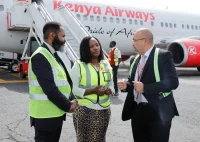The multi-billion shilling boda boda sector in Kenya is staring at an uncertain future as the government moves in to introduce sweeping regulatory measures.
The outcry sparked by a viral video of a female motorist’s horrific experience with a group of boda boda riders on Forest Road has become the catalyst for a larger discussion on the sector. The industry has employed thousands and continues to sustain livelihoods while offering Kenyans more mobility options, but many feel as if the riders have become a law unto themselves.
Parallels have been drawn between the crackdown unleashed on boda bodas and the former Transport Minister John Michuki’s often-cited operation to reform the matatu (public service vehicle) sector, which at the time was considered out of control.
Already the crackdown ordered by President Uhuru Kenyatta has seen all boda bodas operating in the country ordered to re-register with the National Transport and Safety Authority (NTSA). The Ksh5,000 licensing fee has been waived.
Data from the Kenya National Bureau of Statistics (KNBS) shows that average monthly registrations of new boda bodas has been rising steadily from 15,536 in 2015 to 18,000 in 2020. The numbers line up with the fact that, in the last decade, more Kenyans have embraced boda bodas as a preferred mode of transportation.
READ>>Nairobi: 2-Day Water Supply Disruption Hits the City
On Tuesday, March 8, over 200 riders had their bikes impounded in Nairobi alone. Delivery riders and other motorcyclists took to social media to complain after being netted in the operation despite them not operating as boda bodas.
Police and NTSA officials also began strictly enforcing regulations touching on extra helmets for passengers, identification for riders, insurance and carrying capacity.
Association with críme and disorder has not helped to boost the public perception of the boda boda sector. The fact that the sector has allowed countless Kenyans an avenue to feed their families, however, also cannot be ignored.
Stories of boda boda riders forming investment groups and completing major real estate projects have on several ocassions hit the headlines and left many feeling inspired.
The Boda Boda Safety Association of Kenya estimates that there are 1.4 million boda boda riders in the country. Their sheer numbers have also made them a political constituency courted by leaders eyeing seats including the Presidency.
The sector now stands at a crossroads amid fears that, left unchecked, it could generate more problems for regular Kenyans. Some have suggested the installation of centralized metering systems with GPS for all boda bodas, citing similar moves in Kigali, Rwanda.
Self-regulation among riders, who already boast organized leadership structures, could also be essential to driving change.
What is clear, however, is that the State will keep a much closer eye on the sector in coming days and years.
READ>>You Will Pay More for Water, Alcohol and Boda Bodas as KRA Raises Tax

![The boda boda sector in Kenya stands at a crossroads. [Photo/ Capital FM]](https://businesstoday.co.ke/wp-content/uploads/2022/03/images-21.jpeg)











Let the government try to differentiate between delivery riders(couriers) and boda boda riders….I myself joined Glovo delivery on the grounds of job loss due to covid19 outbreak….now this delivery industry has been catering for my bills but now am forced to stay at home due to the recent incident along forest rd…..am humbly urging our Glovo CEO madam Priscillah to chip in n help her delivery boys be safe in line of their duties… yesterday Glovo couriers were not spared either.
Regards
Glovo courier